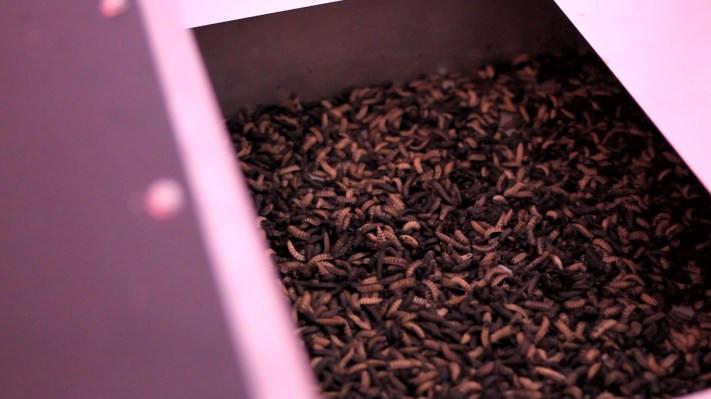No matter how many tears are shed watching “Okja,” people are still going to eat meat—and the raising of meat is hard on the planet. Even feeding livestock and fish has an ecological cost. Soybean farming can lead to soil erosion and farmed fish still contribute to overfishing if their food is caught from the ocean. Entocycle, which is currently participating in Y Combinator, wants to solve the food chain conundrum with another source of protein: black soldier flies.
Not only can the larvae of black soldier flies be made into animal feed, but they also gobble down food waste during their short lives, doubling the environmental benefits of Entocycle’s automated system. The larvae are monitored with visual recognition and machine-learning tech, making Entocycle cost-efficient and scalable enough to make an impact on the animal protein feed industry, which the startup says is worth $150 billion.
Entocycle, which already has a facility in London, was founded three years ago by Keiran Whitaker. After earning a Masters in environmental design, Whitaker spent a few years working as a scuba diving instructor.
“It meant that I’ve lived in Southeast Asia, Central America, South America. Everywhere I went, I saw that we are deforesting rainforest and jungles at alarming rates and oceans are becoming completely stripped of life at a faster and faster pace, and it’s all to feed us in the West,” he says.
In graduate school, Whitaker studied sustainable urban development, but he realized that green architecture can’t help “if everyone jumps into a Ford and drives around the corner to pick up food grown halfway around the world.” He began to look at food production instead and launched Entocycle in 2014.
[gallery ids="1528935,1528936,1528937"]
While crickets and mealworms can also be turned into protein feed, Whitaker says that they need to be raised on chicken feed or low-quality flour. The larvae of black soldier flies, however, will feast on organic waste from large range of sources, including breweries and commercial kitchens. Because they are not picky about what they eat, black soldier flies are well-suited to being raised in an automated system.
About five percent of Entocycle’s eggs (each female can lay up to 1,000) are used to repopulate new cycles, while the other 95 percent are hatched and fed food waste. After a week, those larvae are ready to turn into animal feed. Entocycle’s automated pods monitor how the insects are doing while collecting analytics about their development and environment.
“At the end of the day, we want to keep it simple. We have a box where we put food waste and baby larvae, leave it for one week, let the insects do the hard work and at the end of it we have fertilizer and protein,” Whitaker says.
Entocycle plans to grow its business by going directly to the top of the agricultural food chain: supermarkets. Whitaker says they are in discussions with several major retailers to start using Entocycle’s system at their feed suppliers. The company was given a boost recently when the European Commission approved the use of insect protein to feed farmed fish (in the U.S., regulations vary by state). For fish farmers, Entocycle means that they don’t have to worry about overfishing or the climate affecting the cost of feed.
So far, Entocycle has raised just under $1 million in grant money from the U.K. government, the European government and the European Space Agency, which is interested in using insect protein on long-term missions.
Whitaker says that the perception of insect protein as a nutrient source has changed dramatically since he founded Entocycle three years ago. While he believes it’ll be about a decade before people get comfortable seeing insects on their tables, he thinks insect protein will be the norm for livestock and aqualculture feed within three years.
“The insect industry is in the dial-up era right now and we want to achieve the smartphone era,” says Whitaker.
